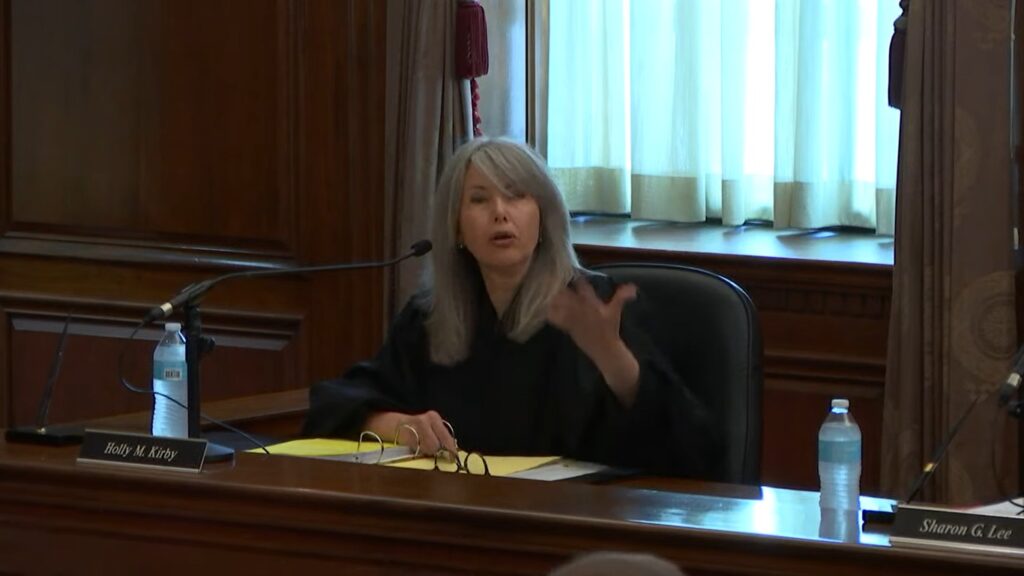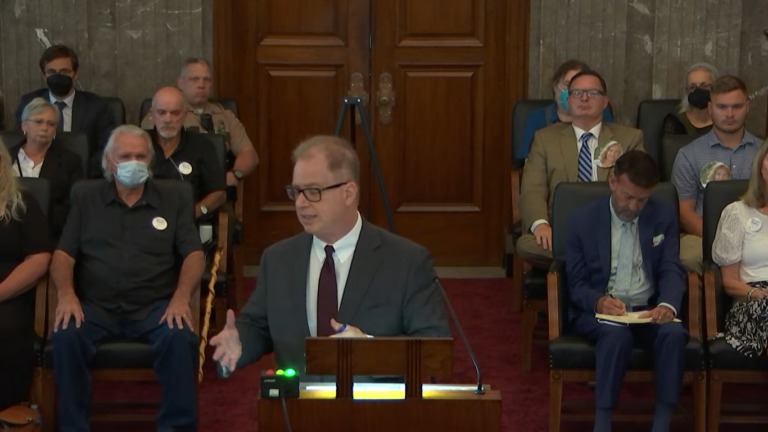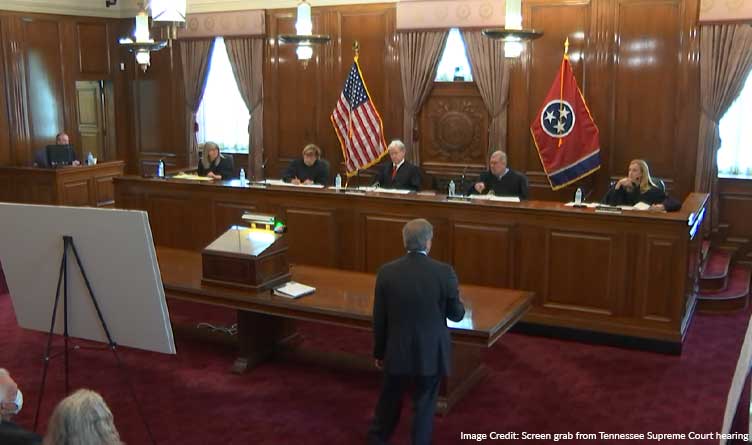Image: Dwight Tarwater, attorney for Jacobs Engineering, argues before the Tennessee Supreme Court on June 1. Image Credit: Screen grab from Tennessee Supreme Court hearing.
By Jamie Satterfield [Tennessee Lookout -CC BY-NC-ND 4.0] –
With workers twice rejecting settlement offers and federal court judges shooting down multiple appeals, Jacobs Engineering Inc., turned to the Tennessee Supreme Court in an attempt to escape financial responsibility for its role in the alleged poisoning of the Kingston coal ash disaster workforce.
Sickened Kingston disaster workers and survivors of workers who have died since a 2008 Tennessee Valley Authority coal ash spill packed the courtroom as Jacobs Engineering sought to convince the justices to classify coal ash — a stew of radioactive material, heavy metals and toxic poisons — as silica dust under Tennessee law.
The argument was apparently designed to force the dismissal of many, if not all, of the federal court cases the firm faces in the Kingston disaster and is the first attempt in the state to include coal ash, the byproduct of burning coal to produce electricity, under the umbrella of Tennessee’s Silica Claims Priorities Act.
*** Click Here to Support Conservative Journalism in Tennessee. We can’t bring you stories like this without your support!***
The Tennessee silica law was designed to cover cases in Tennessee involving specific diseases associated with exposure to dust from silica quartz by workers in the fields of mining, blasting, stone cutting and road building. The law places various deadlines and requirements on workers seeking to recover damages from silica exposure.
“Is it your position that (the silica claims law) in this case encompasses coal ash in its entirety?” Justice Sarah Campbell asked Jacobs’ attorney Dwight Tarwater.
Tarwater replied, “Absolutely, Your Honor.”
“According to your interpretation, that expands the reach of the (silica claims law) exponentially,” Justice Holly Kirby said. “Breakfast cereal contains silica (as does) … Goody’s headache powder.”
Kirby questioned why Jacobs waited for more than eight years after Kingston disaster workers first filed suit to make its silica claim.

“What am I missing?” she asked.
Justice Sharon Lee echoed Kirby’s concern with Jacobs’ delay in raising its silica defense.
“It’s almost a gotcha on these plaintiffs — ‘you didn’t file on time’,” Lee said.
‘These aren’t silica claims’
Lee and Kirby weren’t alone in questioning why Jacobs only recently sought legal cover from a Tennessee law in litigation that has been pending since 2013 stemming from a spill at TVA’s Kingston Fossil Plant.
Kingston disaster worker Mike McCarthy, who attended Wednesday’s hearing, said he was dismayed and disheartened by the firm’s repeated appeals since he and his fellow workers convinced a federal jury in 2018 that Jacobs’ had breached its duty to protect them.
That verdict set the stage for workers to seek to pursue damages in separate trials, but Jacobs’ appeals have ground the legal process to a halt. More than 50 workers who cleaned up TVA’s massive spill have died since the 2018 verdict. At least a half dozen others are terminally ill and more than 200 of the workers who participated in the cleanup are also sick.
“We can see two actors in court getting answers faster than the dying and sick,” McCarthy said in a reference to the returning of a verdict Wednesday in a defamation case involving actor Johnny Depp and his former girlfriend, Amber Heard.
Attorney Mark Silvey, who argued on behalf of the Kingston workers at Wednesday’s Supreme Court hearing, said the laborers have never claimed they were sickened by silica dust.
“(Jacobs) seeks to have this court shield it from responsibility for turning an environmental disaster into an occupational disease disaster that was as tragic as it was avoidable,” Silvey told the justices. “None of the illnesses for which these workers are seeking relief are silicosis … It’s the radioactive particles, arsenic, lead, Radium 226 and Radium 228 (in coal ash that is at issue). These aren’t silica claims.”
Tarwater countered that coal ash also contains silica and, therefore, should fall under the Tennessee law. He initially said silica dust makes up 40 percent of the ingredients in coal ash but later said it was 60 percent.
“The (Tennessee silica law) is very clear,” he said. “It’s very unambiguous. This case is all about statutory interpretation … It’s a spectacularly broad definition … This is a case about exposure to a substance that is 60 percent silica.”

It could be months before the state’s high court issues a ruling. Once the court rules, the case will return to U.S. District Judge Tom Varlan for further proceedings.
Testimony: Jacobs denied workers protective gear
TVA internal documents dating to 1985 show agency officials have known for decades its coal ash was radioactive and full of dangerous heavy metals and toxins but publicly asserted the toxic stuff was no more dangerous than dirt when 7.3 million tons of it smothered 300 acres and polluted public drinking water sources in Kingston after the spill.
After a tipster in February 2009 alerted the Occupational Safety and Health Administration to the danger the radioactive waste posed to the disaster workforce, TVA claimed — falsely — workers had been provided respiratory and skin protection immediately after the spill but no longer needed the gear.
OSHA never followed up and destroyed TVA’s false report and all other records related to the radiation complaint after workers sued Jacobs in 2013.
Immediately after the OSHA radiation complaint was filed, an indemnity agreement shows the utility struck a secret deal with Jacobs to cover the contractor’s legal bills for any coal ash related illnesses and deaths.
Federal court testimony has shown Jacobs told clean-up workers coal ash was safe enough to eat daily, denied their requests for protective gear and tampered with testing designed to monitor the threat the radioactive waste posed.
Believing that TVA was immune as a quasi-governmental agency, the workers sued Jacobs. The firm tried in the early years of the litigation to convince Varlan to declare Jacobs immune, too. He refused.
When the U.S. Supreme Court in 2019 stripped TVA of automatic immunity in an unrelated case, Jacobs again raised an immunity defense. Varlan again shot it down. Jacobs appealed to the 6th Circuit U.S. Court of Appeals.
The 6th Circuit earlier last month ruled that TVA would not have been immune from the workers’ claims and refused to grant Jacobs immunity.
Jacobs in 2020 offered the workers $10 million if they would agree to vacate the 2018 verdict, destroy all records on Jacobs’ conduct in the clean up and never again speak about what happened to them. Workers refused.
The Tennessee Lookout has learned the firm again pitched a settlement offer to the workers earlier this year. They turned it down, too.
Although McCarthy did not disclose any information about the settlement offers in an interview Wednesday with the Tennessee Lookout, he expressed doubt that the firm was willing to concede guilt.
“Their talk about wanting to settle is just that — talk, nothing more,” he said. If they were genuine about it, it would already have happened. The only way we’re going to get justice is if we push to get them in front of a jury.”

About the Author: Jamie Satterfield is an investigative journalist with more than 33 years of experience, specializing in legal affairs, policing, public corruption, environmental crime and civil rights violations. Her journalism has been honored as some of the best in the nation, earning recognition from the Scripps Howard Foundation, the Society of Professional Journalists’ Sigma Delta Chi Awards, the Green Eyeshade Awards, the Tennessee Press Association, the Tennessee Managing Editors Association, the First Amendment Center and many other industry organizations.




